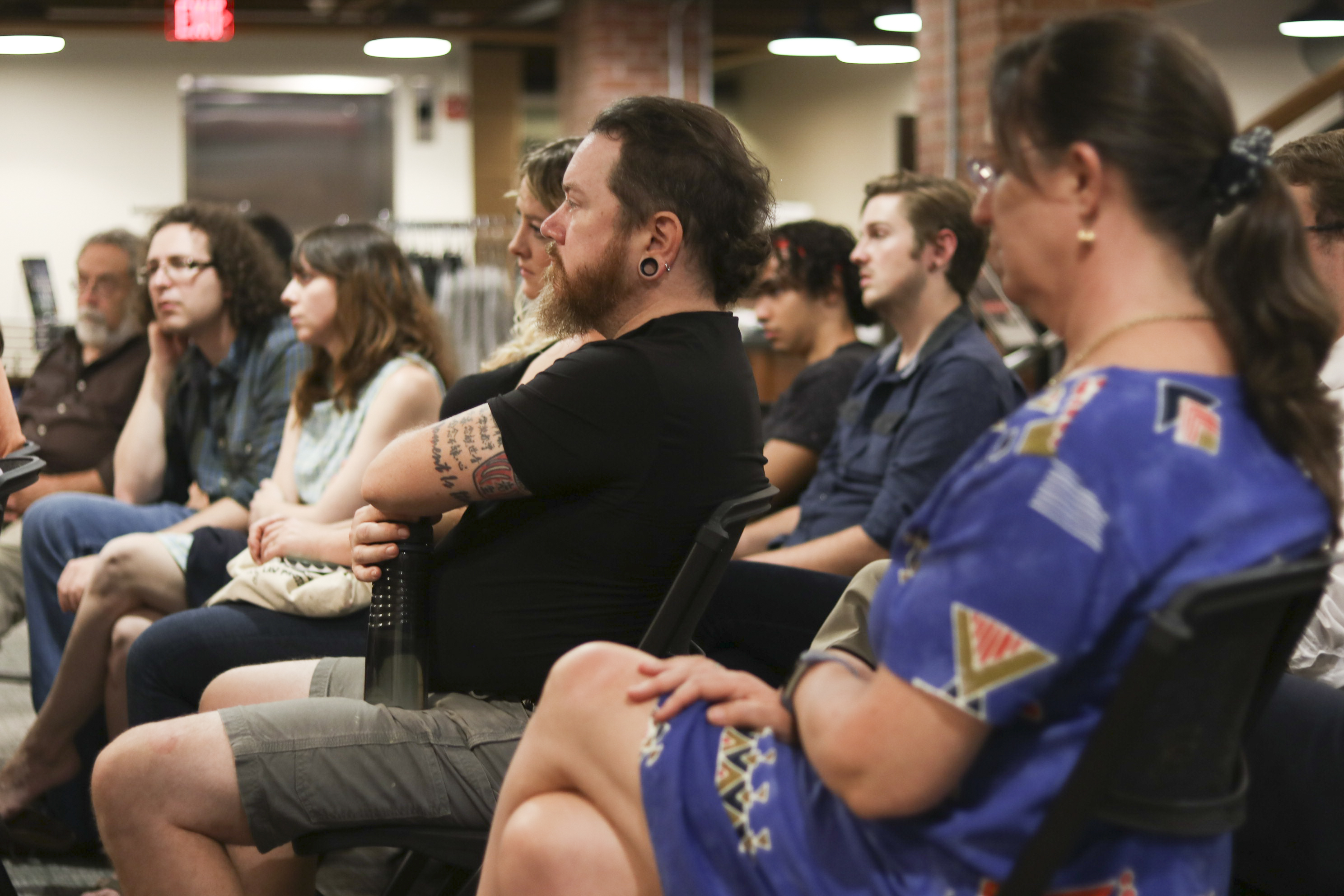
William Halliday, Photo Editor
On Wednesday, Oct. 10, Professor of American Studies and Chair of the American Studies Department J. Kēhaulani Kauanui led a discussion at Wesleyan’s R.J. Julia Bookstore about her new book, “Speaking of Indigenous Politics: Conversations with Activists, Scholars, and Tribal Leaders.”
The book is a collection of interviews that were featured on Kauanui’s radio show, “Indigenous Politics from Native New England and Beyond,” which ran on WESU 88.1FM, a University-affiliated radio station, from 2007 to 2013 and featured nearly 200 interviews with indigenous officials, political leaders, activists, scholars, and artists.
Kauanui began the talk by discussing the implications of the annual celebration of Columbus Day, and its current status as one of eight federally recognized holidays. Even though dozens of cities have either replaced Columbus Day with Indigenous Peoples’ Day or officially recognized this new holiday, the federal government’s continued observance of Columbus Day represents a continued disrespect for the struggles of indigenous peoples and the persistence of settler colonial systems.
Kauanui said that abolishing Columbus Day as a federal holiday will only go so far in recognizing and counteracting the violence and displacement that indigenous peoples have faced around the world.
“I see [Columbus Day] as naturalizing and normalizing colonial violence including sexual violence,” she said at the beginning of the event.
She emphasized that even if Columbus Day were removed from the federal calendar, the colonial domination that indigenous peoples have experienced for centuries will continue to be perpetuated because they still lack sovereignty over the lands that were taken from them by European settlers and are now controlled by the federal government.
Kauanui pointed out that some historians mistakenly understand colonialism in the U.S. to have ended with the conclusion of the American Revolution. She emphasized that the invasion and seizure of indigenous lands is ongoing and is not a one-time event.
“There are still historians in American history that would claim that colonialism ends with the American Revolution,” she said. “That’s when English colonialism might end here, but what you have is U.S. settler colonialism. That’s the difference…. Linking back to Columbus, the Doctrine of Discovery underwrites all of that…. There is no consensus that indigenous peoples today have the right to full self-determination.”
Throughout her talk, Professor Kauanui spoke of this Doctrine of Discovery as underlying all past and present colonial domination of indigenous populations. This doctrine, which was first declared in a papal bull issued in 1493, authorized European Christian powers to invade and exploit any territories not inhabited by Christians. The U.S. Supreme Court solidified this doctrine in U.S. law in 1823 with its decision in Johnson v. M’Intosh, which stated that the U.S. government owned all land inherited from Great Britain, which used the Doctrine to legitimize its seizure of native lands.
Kauanui called the Doctrine of Discovery a Christian supremacist ideology and said that this system of domination forms the basis of all international and federal laws regarding the treatment of indigenous tribes. Because this Doctrine is inherently religious in nature, Kauanui argued that its continued use shows that the separation of church and state is not adhered to when it comes to colonial domination.
Tying her discussion back to Columbus Day, she emphasized how abolishing the holiday will not do away with the systems of colonial legitimacy that the Doctrine of Discovery has created and continues to support.
“When you start to have settlers come and do their own colonization in a quest for land and other riches…they have to kind of make it up as they go along to justify and legitimize their own theft,” Kauanui said. “So yes, abolish Columbus Day, but it’s going to take a lot more than that.”
She then continued the discussion by reading an excerpt from her book’s introduction, which details how she selected the 30 interviews included in the book and produced her radio show, which at the time was the only indigenous issues show based in New England. She saw her radio show as a way to highlight indigenous struggles and educate people on native populations in an accessible way.
“The program aimed to reach multiple audiences about serious political and cultural issues,” she read. “I designed it to provide a platform for the general public to think carefully about a range of indigenous politics that shape everyday life in native New England and beyond in an accessible language that was also analytically rigorous.”

William Halliday, Photo Editor
The radio program focused on themes of land desecration, treaty rights, cultural revitalization, and erasure, and she saw the conversations that she broadcast as political acts countering the processes of elimination inherent to settler colonialism. She sees independent media as crucial to carrying out political acts like these and exposing people to indigenous voices and stories. In an email to The Argus, Kauanui highlighted the role independent media plays in educating people on these issues, writing that mainstream media and even public radio stations like NPR rarely discuss indigenous peoples and activism.
Kauanui concluded the event by answering questions from the audience. One audience member asked why Kauanui was particularly drawn to radio and what this medium allowed her to do that a paper could not. Kauanui responded that since WESU is an affiliate of the Pacifica Radio Network, her show could be broadcast by stations around the country and widen the scope and accessibility of its content.
Another member of the audience asked about current measures being taken to pressure the Papacy to renounce the Doctrine of Discovery that has legitimized the oppression of indigenous populations around the world for centuries.
“The Catholic Church has apologized for a number of things like the witchcraft trials, its treatment of Jews, and sexual abuses,” the audience member asked. “Have they renounced the Doctrine of Discovery?”
Kauanui responded that while the Papacy has apologized for certain things that may be tied to its role in colonial violence, it has not touched the Doctrine.
“The church has apologized for different things,” she said. “You have the apology for the poor treatment of individuals, but not challenging the doctrine itself…. If you’re talking about normalization, and you actually renounce the Doctrine of Discovery and on what basis…it really pulls the rug out from under it, because that’s the fiction.”
Gary O’Neill, a genealogist for the Wangunk people in Middlesex County and one of the last Wangunks living in East Hampton, Conn., was in the audience on Wednesday evening. In an interview with The Argus, he spoke about his role as the family historian for the Wangunks. He is the keeper of his family line’s records and photos, including records of ancestors who fought in the Civil War, WWI, and WWII.
He spoke about Professor Kauanui’s interest in and involvement with the Wangunk people and their collaboration on a course she taught in fall 2015 called “Decolonizing Indigenous Middletown: Native Histories of the Wangunk Indian People.”
“I give Kehaulani a lot of credit because she really reached out and met a lot of family members and tried to expose her students to who we were and she’s unlike anybody else at Wesleyan because nobody’s reached out to us like that,” he said. “For her to do a whole class and continue on with it is something that’s unique to her. I think she’s really committed to indigenous people, and it’s not just the Wangunk, it’s anybody who’s indigenous. Her background speaks highly to her commitment.”
He described the Wangunk people as currently unnoticed because they are believed to have died off years ago. He also discussed what he sees as the state of indigenous peoples today and the importance he sees in preserving his community’s history.
“I think that with the present administration, it’s extremely scary,” he said. “I don’t think it’s just scary for indigenous people…It’s a very dark time in our history because things are not getting better. When tribal land can be taken with just the movement of a pen…. Because we’re a small nation, we are invisible. It’s a dismal and dark time for indigenous people…. I really feel that our history is important, and I want to preserve it.”
William Halliday can be reached at whalliday@wesleyan.edu.
Comments are closed